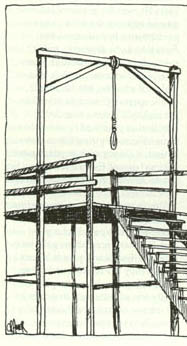 is the United States the only Western democracy that still endorses the ultimate sanction, in recent years we have expanded it. Congress not long ago authorized the death penalty for such federal crimes as peacetime espionage by military personnel and drug-related murders. Here in Illinois one of 38 states that condones capital punishment the General Assembly has expanded the list of crimes that automatically qualify a convicted murderer for death under its revised capital punishment statute. Today, death may be sought in Illinois for convicted killers (perhaps we should say convicted alleged killers) of police, correctional officers, firefighters or community policing volunteers, as well as those who kill multiple victims, kill while committing a hijacking or under any of the 14 other "aggravating factors." Certainly Americans cannot support the death penalty because it works. There is no conclusive evidence that frying, hanging, poisoning or shooting one killer deters other killers, especially when the punishment is so seldom applied or so long delayed. Nor does it save money. According to the Illinois Coalition Against the Death Penalty, it costs $2.5 million to execute a person in Illinois all those lawyers, one assumes - and only $600,000 to keep him in prison for life. And if the death penalty has not rid Illinois of murder, neither has it rid Illinois of murderers. Most murderers who might qualify for the needle are never caught, or plea-bargain themselves a lesser charge; if being killed for killing is not a cruel punishment, it certainly is an unusual one in Illinois. Why then? For one thing, the United States is by some measures the most Christian nation in the West. There is evidence that many jurors in capital cases vote for death on the assumption the courts will overturn the decision on appeal; believers may do something like that too, reasoning that if the courts send the wrong person to his death, God the real supreme court - will fix it in heaven. Of course, Christians (especially Catholics) also are among the staunchest foes of capital punishment. As happens so often, the Bible offers room for many views. Christ may have warned that those who take the sword shall perish with the sword, but it is left to believers to decide whether that admonition applies to executioners as well as murderers. One motive is fear of violent crime, which is pervasive (more pervasive, in fact, than is violent crime). To many Europeans, we Americans remain a half-civilized, even barbarous people, barely weaned from the frontier. And indeed, there still is a lot of Dodge City in our towns and cities. (Recall that, after Lincoln, the Illinoisan most recognized abroad before the Michael Jordan era was Al Capone.) We keep the death penalty around in spite of its manifest unreliability, the way a frail woman, home alone, might keep the rusty old shotgun in the corner. It probably won't fire, and even if it does she knows she's more likely to shoot the cat than kill a rapist, but she feels safer with it there anyway. Some opponents of the practice blame its persistence on politicians. Not having a clue about how to get tough on crime, demagogues love to get tough on criminals instead. Certainly, seeking to kill killers seems to do no harm to ambitious politicians in Illinois. In less tolerant societies the defense lawyers, judges or state s attorneys who send innocent people to Death Row might get four years as inmates for attempted manslaughter; in Illinois, they get four years as mayors or attorneys general. Of course, politicians in all Western democracies pander to their public's worst instincts, but none other uses the death penalty. Are Americans' worst instincts worse than, say, those of the Brits or the French? Some opponents think so, accusing Americans of bloodlust. Most evidence suggests Americans tolerate the death penalty in spite of its violent nature, rather than because of it. Hugo Adam Bedau is Fletcher Professor of Philosophy at Tufts University. In one of his oft-quoted treatises deploring capital punishment, Bedau excoriates execution as "a dramatic, public spectacle of official, violent homicide." Official homicide it is, and violent it must be, but "dramatic, public spectacle" sounds more like the nightly TV news than lethal injection as practiced by our corrections officials. Putting killers down, indeed, is (along with impeachment debates) one of the few sordid spectacles we refuse to broadcast on television. Illinois used to execute murderers by hanging them in public places, where everyone could get a good seat. We then secreted the gallows in locked jailyards and prison blocks, so that only law officers and press could enjoy the show. Hanging eventually was abandoned altogether as inhumane. (Partly, we shunned the noose for the same reason many now call for abolition of the death penal-
|
Pages:|1 ||2 | |3 ||4 | |5 ||6 | |7 ||8 | |9 ||10 | Pages:|11 ||12 | |13 ||14 | |15 ||16 | |17 ||18 | |19 ||20 |
Pages:|21 ||22 | |23 ||24 | |25 ||26 | |27 ||28 | |29 ||30 | Pages:|31 ||32 | |33 ||34 | |35 ||36 | |37 ||38 | |39 ||40 | Pages:|41 ||42 | |43 ||44 |